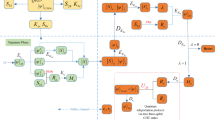Abstract
Entanglement is the main resource in quantum communication. The main aims of the arbitrated quantum signature (AQS) scheme are to present an application of the entanglement in cryptology and to prove the possibility of the quantum signature. More specifically, the main function of quantum entangled states in the existing AQS schemes is to assist the signatory to transfer quantum states to the receiver. However, teleportation and the Leung quantum one-time pad (L-QOTP) algorithm are not enough to design a secure AQS scheme. For example, Pauli operations commute or anticommute with each other, which makes the implementation of attacks easily from the aspects of forgery and disavowal. To conquer this shortcoming, we construct an improved AQS scheme using a new QOTP algorithm. This scheme has three advantages: it randomly uses the Hadamard operation in the new QOTP to resist attacks by using the anticommutativity of nontrivial Pauli operators and it preserves almost all merits in the existing AQS schemes; even in the process of handling disputes, no party has chance to change the message and its signature without being discovered; the receiver can verify the integrity of the signature and discover the disavow of the signatory even in the last step of verification.

Similar content being viewed by others
References
Gao, F., Qin, S.J., Guo, F.Z., et al.: Cryptanalysis of the arbitrated quantum signature protocols. Phys. Rev. A 84(2), 022344 (2011)
Barnum, H., Crépeau, C., Gottesman, D., et al.: Authentication of quantum messages. In: Proceedings of the 43rd Annual IEEE Symposium on the Foundations of Computer Science, p. 449. IEEE Comput. Soc., Washington (2002). arXiv:quant-ph/0205128
Zeng, G.H., Keitel, C.H.: Arbitrated quantum-signature scheme. Phys. Rev. A 65(4), 042312 (2002)
Zeng, G.H.: Reply to “Comment on ‘Arbitrated quantum-signature scheme’’’. Phys. Rev. A 78(1), 016301 (2008)
Gao, F., Guo, F.Z., Wen, Q.Y., et al.: Comment on “Colloidal interactions and transport in nematic liquid crystals”. Phys. Rev. Lett. 101(2), 208901 (2008)
Zhang, W.W., Zhang, K.J.: Cryptanalysis and improvement of the quantum private comparison protocol with semi-honest third party. Quantum Inf. Process. 12(5), 1981 (2013)
Cai, Q.Y.: The “Ping-Pong” protocol can be attacked without eavesdropping. Phys. Rev. Lett. 91(10), 109801 (2003)
Huang, W., Zuo, H.J., Li, Y.B.: Cryptanalysis and improvement of a multi-user quantum communication network using χ-type entangled states. Int. J. Theor. Phys. 52(4), 1354 (2013)
Gisin, N., Fasel, S., Kraus, B., et al.: Trojan-horse attacks on quantum-key-distribution systems. Phys. Rev. A 73(2), 022320 (2006)
Leung, D.W.: Quantum Vernam cipher. Quantum Inf. Comput. 2(1), 14 (2002)
Li, Q., Chan, W.H., Long, D.Y.: Arbitrated quantum signature scheme using Bell states. Phys. Rev. A 79(5), 054307 (2009)
Zou, X.F., Qiu, D.W.: Security analysis and improvements of arbitrated quantum signature schemes. Phys. Rev. A 82(4), 042325 (2010)
Hwang, T., Luo, Y.P., Chong, S.K.: Comment on “Security analysis and improvements of arbitrated quantum signature schemes”. Phys. Rev. A 85(5), 056301 (2012)
Bennett, C.H., Brassard, G.: Quantum cryptography: public key distribution and coin tossing. In: Proceedings of the IEEE International Conference on Computers, Systems and Signal Processing, p. 175. IEEE, New York (1984)
Ekert, A.K.: Quantum cryptography based on Bell’s theorem. Phys. Rev. Lett. 67(6), 661 (1991)
Bennett, C.H.: Quantum cryptography using any two nonorthogonal states. Phys. Rev. Lett. 68(21), 3121 (1992)
Pan, J.W., Bouwmeester, D., Weinfurter, H., et al.: Experimental entanglement swapping: entangling photons that never interacted. Phys. Rev. Lett. 80(18), 3891 (1998)
Gao, F., Guo, F.Z., Wen, Q.Y., et al.: Quantum key distribution without alternative measurements and rotations. Phys. Lett. A 349(1–4), 53–58 (2006)
Curty, M., Santos, D.J., Pérez, E., et al.: Qubit authentication. Phys. Rev. A 66(2), 022301 (2002)
Buhrman, H., Cleve, R., Watrous, J., et al.: Quantum fingerprinting. Phys. Rev. Lett. 87(16), 167902 (2001)
Abruzzo, S., Bratzik, S., Bernardes, N.K., et al.: Quantum repeaters and quantum key distribution: analysis of secret-key rates. Phys. Rev. A 87(5), 052315 (2013)
Choi, J.W., Chang, K.Y., Hong, D.: Security problem on arbitrated quantum signature schemes. Phys. Rev. A 84(6), 062330 (2011)
Zhang, K.J., Zhang, W.W., Li, D.: Improving the security of arbitrated quantum signature against the forgery attack. Quantum Inf. Process. 12(8), 2655 (2013)
Acknowledgements
This work is supported by NSFC (Grant Nos. 61300181, 61272057, 61202434, 61170270, 61100203, 61121061), Beijing Natural Science Foundation (Grant No. 4122054), Beijing Higher Education Young Elite Teacher Project.
Author information
Authors and Affiliations
Corresponding author
Rights and permissions
About this article
Cite this article
Liu, F., Qin, SJ. & Huang, W. An Arbitrated Quantum Signature with Bell States. Int J Theor Phys 53, 1569–1579 (2014). https://doi.org/10.1007/s10773-013-1955-y
Received:
Accepted:
Published:
Issue Date:
DOI: https://doi.org/10.1007/s10773-013-1955-y




